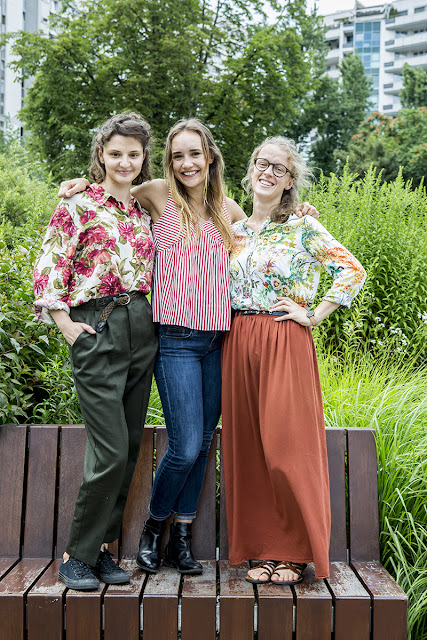GośćInność – initiative created by Nina Bilal combining education with fun of cooking and uniting teenagers and migrants at the table. And us – three women passionate about making the world more conscious about migrant and refugee rights (and also women who love to eat!).
Us! Małgosia, Anna and Nawojka, credits: Alicja Szulc
Opening the envelope and getting to know the possible challenges was exciting. And once we found out - we couldn’t decide. All three of them were interesting and to we felt we could somehow contribute to all of them. After consulting with Nina, we picked the education challenge – to prepare a workshop scenario which combined learning how to cook from a migrant (a trademark of GośćInność’s initiative) with different educational activities providing pupils the basic knowledge about the topic of migration, with a special focus on women’s rights.
Where did we start? From our target group! We created a survey to get to know what teenagers aged between 12 and 16 years old would like to do during a workshop about migration. We reached out to almost 30 people whose answers were very similar. Most of them wanted to meet the migrant or refugee in person and “somehow feel what migrants and refugees feel.” The first request was not that difficult to fulfill – as mentioned before, the cooking workshop is led by migrant. For the second however, one we spent a lot of time brainstorming. We had a lot of doubts and questions in mind: how to make it engaging and interesting for teenagers? How to incorporate the gender component into the scenario? How to pass the knowledge in the most effective way? How to make teens reflect and better understand the situation of migrants and refugees?
We came up with many ideas, drank countless cups of coffee while discussing the pros and cons of each idea for the workshop. Finally, we picked the three that are included in our scenario. We also spent another hours mastering the activities, putting the scenario together and preparing a PowerPoint presentation and materials. Today, it is ready, beautifully designed and waiting to be tested out. We intended to organize the event to test the scenario with teens, but as the school year is already finished and we lacked extra time, it turned out to be almost impossible. So we’re waiting for this opportunity in September!
First page of the scenario made for GośćInność
Simultaneously with the scenario, we planned filming of the video that would serve both as an introduction to the workshop and a promo video on the social media – as nowadays all NGOs need Facebook pages and GośćInność needs more followers. At first, we wanted to film refugees and migrants answering shortly simple questions. We got in touch with migrants Nina is already collaborating with and… quickly we realized we need to change our concept. Everyone was really willing to help, but the first question they were asking was: Will my face be visible? So we came up with the idea of recording the audio and filming just hands of people cooking. The process of organizing the whole thing went very fast - miraclously we managed to schedule together someone recording the audio, our co-fellow who’s videographer and three wonderful people willing to share a piece of their story. As a result we got a 1 minute video – available on vimeo and GośćInność’s Facebook page!
Our movie studio
The output phase went by very fast and was definitely intense and challenging time for all of us. The most of all – time of learning. We learned how to work as a group, equally divide tasks, how to support each other and consider every idea as a possible solution. We received a lot of help from different people and discovered, how much more effective we are if we work together.Most importantly – that our activism is not finishing here, it just enters the new path.



Comments
Post a Comment